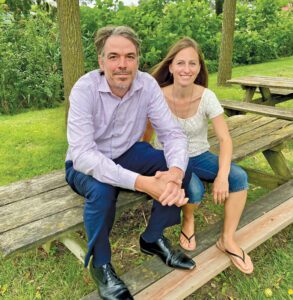In the early 1960s, a group of community leaders organized to help underprivileged children get a chance to go to summer camp. Managed through the United Way, they awarded their first “camperships” in 1962.

A national search brought Matt Tarver-Wahlquist to Washtenaw Camp Placement last year; the new executive director’s first change was to hire Amanda Fales as program director. While he focuses on fundraising and grant writing, Fales runs the program and handles social media, primarily Facebook and LinkedIn. One post brought in a $35,000 grant. | Photo: Jane DeLancey
“Sending kids to camp is an investment in our communities,” says Sally Lamkin, director emeritus of what’s now Washtenaw Camp Placement (WCP). “The camping experience helps with social and personal growth and encourages independence in children.”
Fast forward to 2022. At its sixtieth anniversary celebration, the independent nonprofit announced that it had awarded more than 10,000 camp scholarships. With no government support, however, the organization has struggled at times to stay afloat.
Former executive director Jane Talcott guided WCP through treacherous waters following Pfizer’s exit from Ann Arbor in 2008. The drugmaker’s staff had contributed a quarter of the United Way’s revenue, and in the aftermath, WCP was one of the programs that lost funding.
That forced the group to do more direct fundraising. In 2013, EMU professor and past WCP president Bill Fennel helped by establishing an endowment through the Ann Arbor Area Community Foundation. Fennel passed away in 2017, but the endowment is still accepting donations and paying dividends.
When Talcott told the board she was ready to retire in 2022, members decided—for the first time ever—to conduct a nationwide search for a new executive director. The Andrews Group, a local HR firm with deep Ann Arbor roots, was contracted to conduct the search with Megan Rodgers guiding the process.
Rodgers says they identified 120 candidates in their initial search. Through testing and phone and in-person interviews, the list was winnowed down to four finalists. Matthew Tarver-Wahlquist emerged as the unanimous selection.
“Matt brings new ideas and energy to the organization,” Rodgers says. “He is interested in preserving WCP legacy while also enhancing the [executive director’s] role.”
Tarver-Wahlquist moved to Michigan with his family last year from Tucson, where he was the executive director of a literacy program. Prior to that, he ran a developmental disabilities services organization in San Francisco. With his wife, Chan Coonan, and two children, he went from Southwest city life to Midwestern country life when they bought a house on ten acres in Chelsea.
Tall, usually in blue jeans, and soft spoken, Tarver-Wahlquist has been on the job for just over a year, and is drawing from his years at other nonprofits to implement changes that already are having a positive effect.
“The first change I made was to hire Amanda Fales as program director,” he says. With twenty years’ experience in nonprofits and a master’s degree in nonprofit administration, Fales hit the ground running.
While Tarver-Wahlquist focuses on fundraising and grant writing, Fales runs the program and handles social media, primarily Facebook and LinkedIn. Social media is not an exact science, Fales says, but she posts daily with quotes from camper families, tags to camps’ social media, and other information.
The goal is to raise the profile of this historically low-profile organization, and it’s getting results: A recent post shared by the Andrews Group led to a $35,000 donation from a foundation. “They would not have known about us without our social media postings,” says Fales.
Tarver-Wahlquist consulted with Nonprofit Enterprise at Work (NEW) on a number of issues, including setting up cloud computing, updating the office computer system, and providing ongoing IT support. “We brought our technologies into the twenty-first century,” he says.
A dramatic increase in operating revenue is one measure of their work: $240,000 in the fiscal year that ended in March, up from $134,000 in the prior fiscal year. There’s a benefit event at Misty Valley Farm on May 4 with John U. Bacon as the featured speaker.
WCP partners with six YMCA camps throughout the state. “Y camps give us a certain number of spots,” says Tarver- Wahlquist, “and we get a forty- to sixty- percent discount.” One week of camp costs WCP about $500.
Tuition-free one- or two-week camperships are open to students in fifth grade and above who live or go to school in Washtenaw County. Application requests are sent to schools, community groups, and churches. Responses are reviewed in March and about 150 acceptance letters go out in April. A June orientation will bring camper families together, and sleeping bags, blankets, and other camping gear will be distributed to those who need them.
“Jane and her predecessors built a great foundation for WCP,” says Tarver-Wahlquist. “We want to expand the program and update the operation to make it more sustainable.”